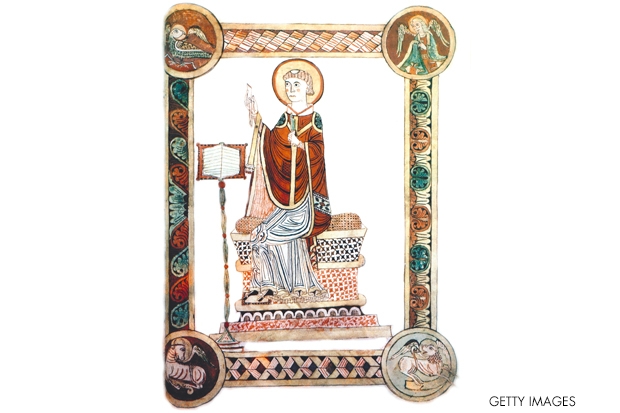It might seem to some a bold move to base a book on any kind of journey at all when its hero entered the monastery at Wearmouth, Northumbria at the age of seven and, as far as we know, never left. Not that Bede was entirely parochial, distributing what was then an exotic luxury, pepper, amongst his peers on his deathbed. But his was essentially a virtual and vicarious world, reliant on a network of informants and an unrivalled library largely collected by its founder, Benedict Biscop, here memorably described as ‘the “millionaire” monk’, even if the more than 200 books we know Bede knew will seem small beer to most of us with bigger bookshelves.
But unlike modern browsers, who tend to flit and sip, Bede’s intellectual curiosity was more than kindled: he really knew his books backwards, and in the best-known of the many that he wrote himself, the characteristically precisely titled Historia Ecclesisatica Gentis Anglorum (‘Ecclesiastical History of the English People’), he offered history with a deliberately narrow focus on the Church on the one hand and the English on the other. With the instincts of a true historian, Bede also meticulously names his local sources, and in doing so he was greatly assisted by the exceptionally incestuous nature of the upper echelons of the contemporary Anglo-Saxon ecclesiastical hierarchy, where members of the royal family of one kingdom were regularly (and often irregularly) related to the aristocracy of the church in another.
In this brisk and often breezy narrative, including glancing references to Doctor Who and The Archers, the distinguished medievalist Henrietta Leyser beautifully lays bare Bede’s prejudices and blind spots: his airbrushing away of the role of the Britons, already Christian when the Anglo-Saxons arrived; his relative reticence about the kingdoms of Mercia and Wessex, whose incipient ascendancies eventually eclipsed that of Bede’s native Northumbria. But in Bede’s world-view, Northumbria naturally dominated, as it does in this book, taking up a third of the space, more than Kent, East Anglia, Essex, and Sussex combined, although Leyser beautifully augments the most glaring gaps in Bede’s knowledge (or at least in his narrative), introducing works from the period that describe the activities of those other towering Anglo-Saxon figures of the late seventh and early eighth centuries. These include Aldhelm of Malmesbury, himself probably a member of the West Saxon royal family, Boniface of Nursling, the Apostle to the Germans, and Guthlac of Crowland, the reformed warrior and visionary; all three, like Bede, came quickly to be celebrated as saints.
With great clarity and charm Leyser offers a bracing and necessary corrective to the notion of a cloistered life in the Dark Ages, an opportunity to escape beyond the monastery walls in a way Bede never could, and to appreciate the lush landscape of Anglo-Saxon England and the quaint or simply curious characters that lived there. For most readers, who generally don’t know their Bassa from their Bebba, this lightning tour through the colourful crowd who inhabited the almost 90 places visited in the course of the book is clearly and cogently organised, with an excellent system of cross-referencing that encourages skipping around the text, and a well-designed and highly necessary index.
This informative and information-packed book reveals just how much of the ancient church in England is visible now, ready to be rediscovered, and highlights not only the work of the rightly revered Venerable Bede, but also other sources and resources that remain and are still being recovered from the seven kingdoms of eighth-century England, when national history was being both recounted and recreated.






Comments